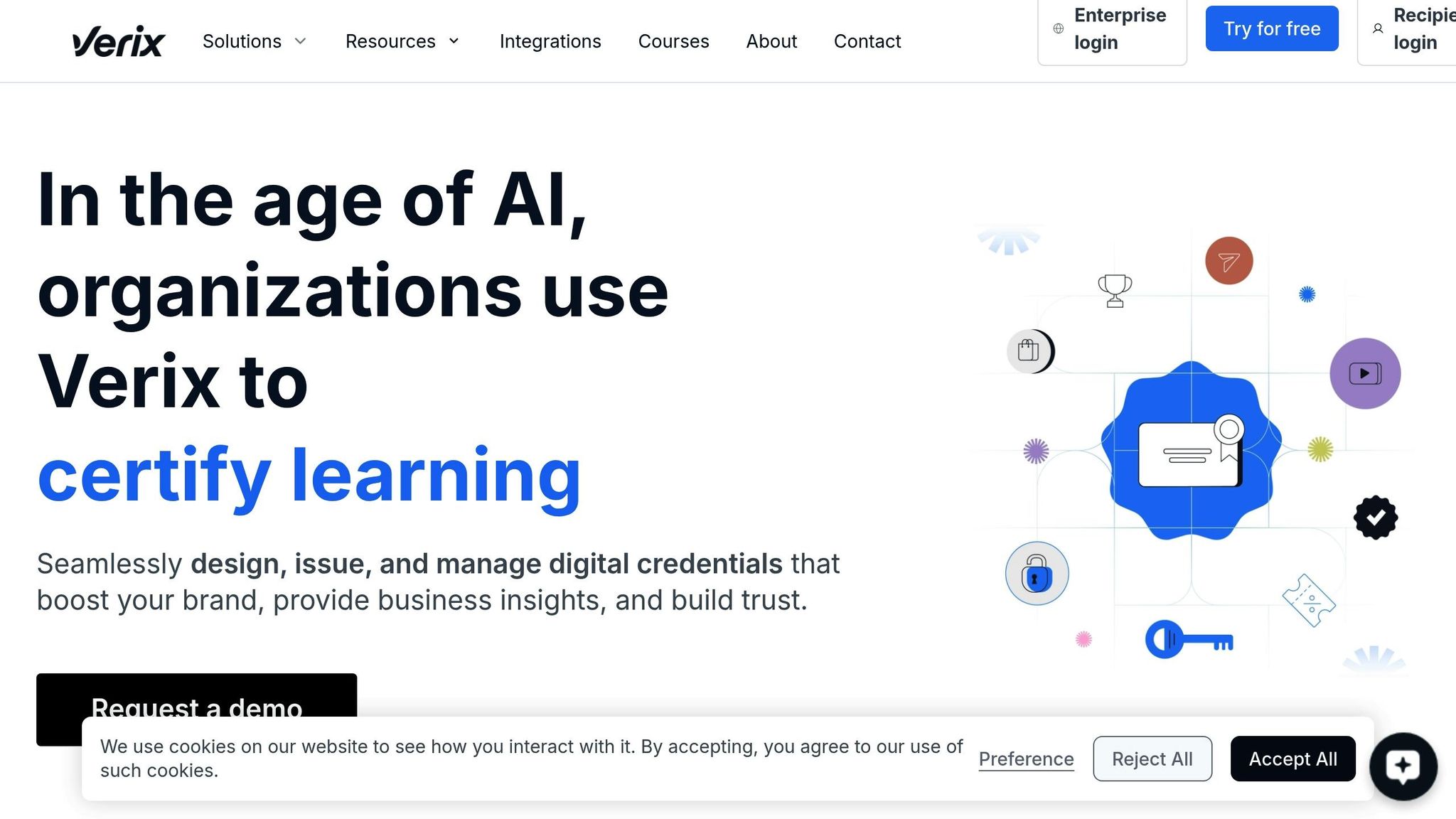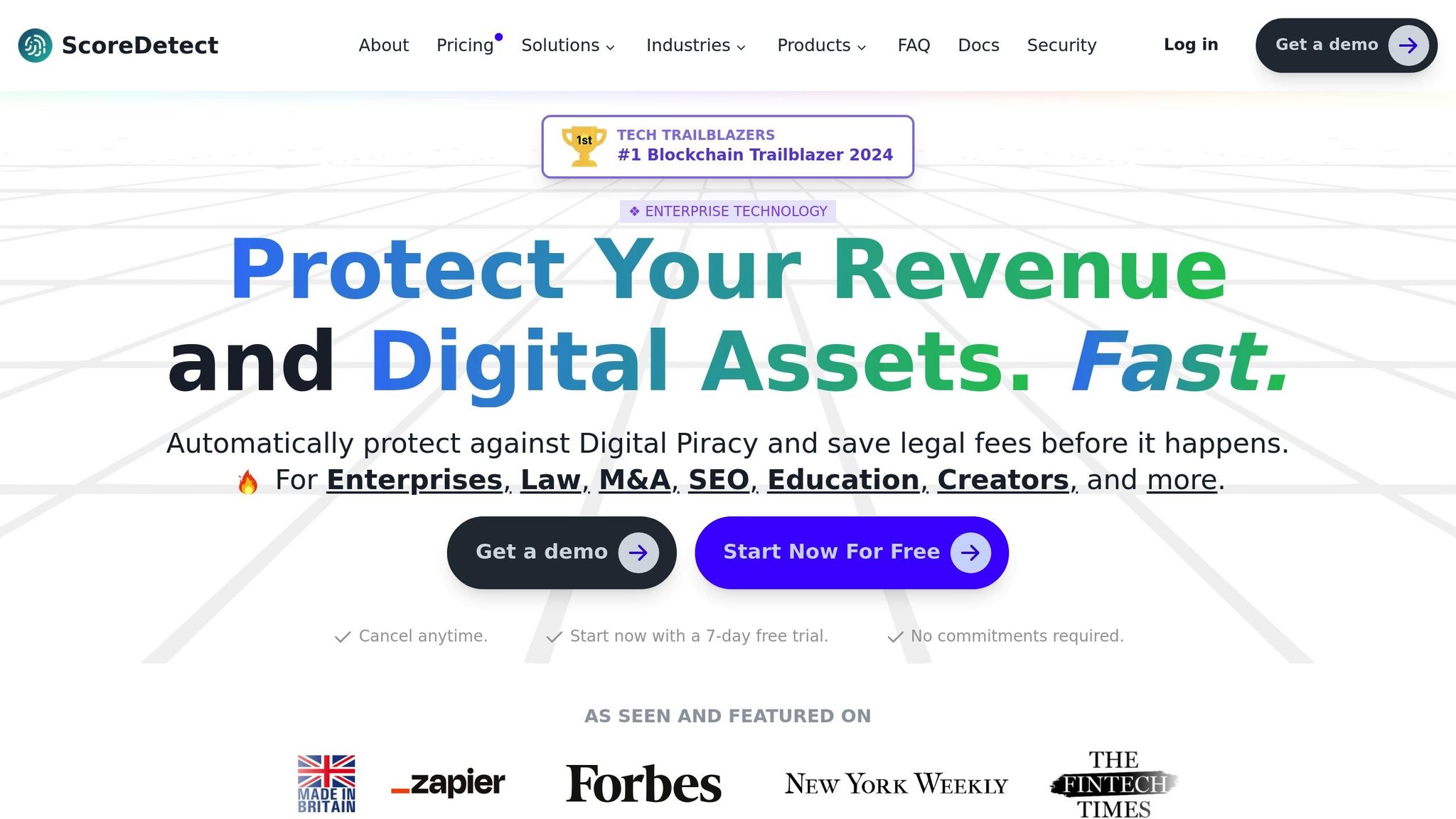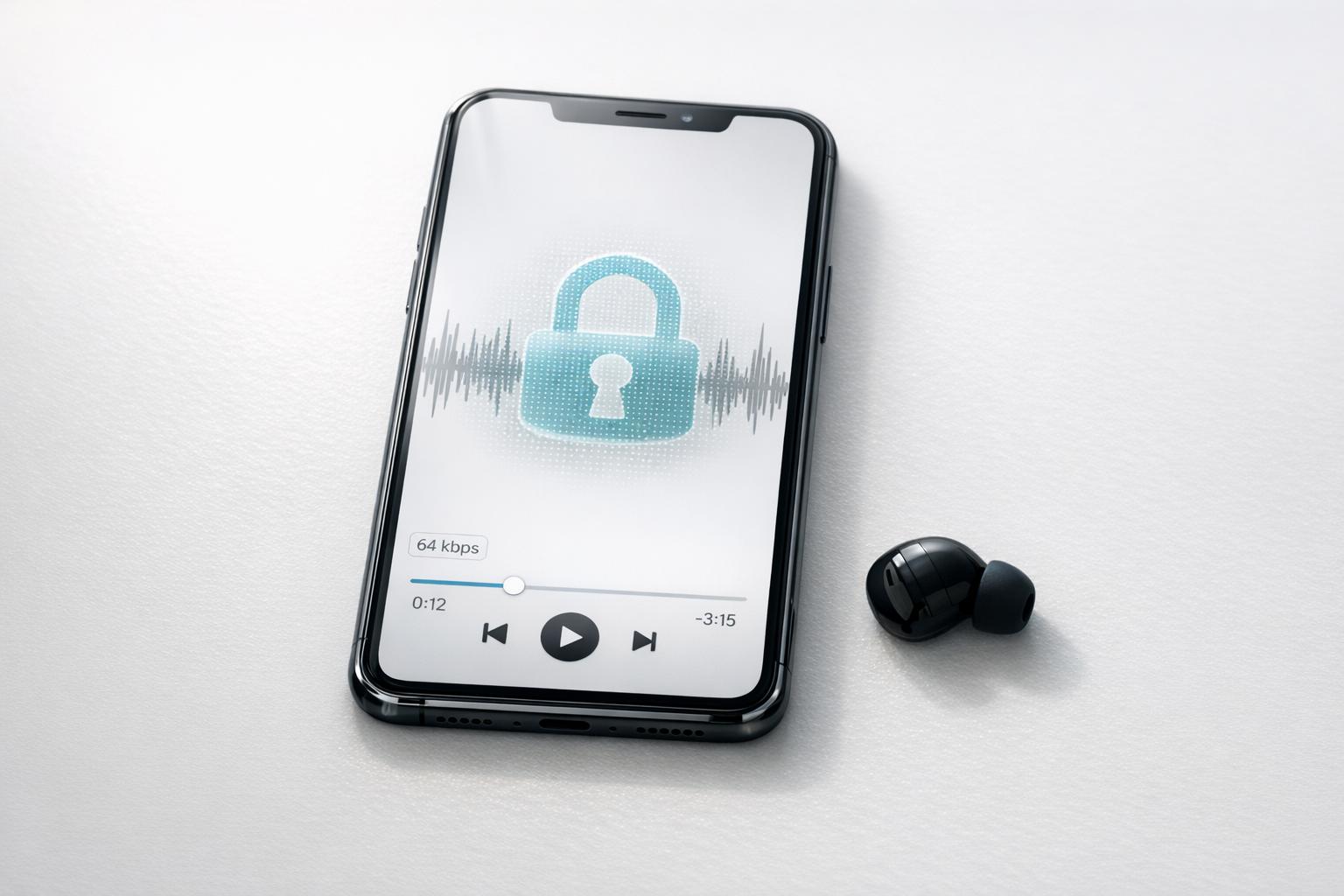In today’s digital world, managing and protecting content is more challenging than ever. Digital piracy is on the rise, costing businesses billions in lost revenue and damaging reputations. At the same time, regulatory requirements for proving ownership and compliance are becoming stricter, especially in industries like finance, healthcare, and media. Traditional tools like watermarks and copyright documentation fall short in addressing these issues.
Blockchain certification offers a solution. It creates tamper-proof records of ownership on a decentralized ledger, allowing businesses to secure their digital assets, meet compliance requirements, and reduce costs. Key benefits include:
- Advanced security: Detects even the smallest tampering with cryptographic hashing.
- Global verification: Ownership can be verified anywhere without intermediaries.
- Transparent audit trails: Tracks every transaction or update with precise timestamps.
- Cost efficiency: Faster and cheaper than traditional copyright registration.
Industries like media, e-commerce, software, and academia are already using blockchain to protect their intellectual property, improve compliance, and streamline processes. Platforms like ScoreDetect combine blockchain technology with features like AI-powered monitoring, automated takedown workflows, and integration tools, making it easier for businesses to safeguard their assets and focus on growth.
For businesses managing large volumes of content, blockchain certification isn’t just about protection – it’s a smarter way to stay compliant and competitive.
Revolutionizing Digital Credentials: Verix‘s Blockchain Innovation

How Blockchain Powers Digital Certification
Blockchain technology has revolutionized the way businesses protect and verify digital content. By creating unchangeable records and providing cryptographic proof of ownership, it ensures that digital assets remain secure and verifiable.
What Blockchain Certification Means
Blockchain certification establishes a permanent and tamper-proof record of ownership for digital assets on a decentralized ledger. Instead of storing the file itself, the system generates a unique checksum – a mathematical representation of the asset – that gets recorded across multiple nodes in the blockchain network.
This unique checksum acts as an unalterable chain of custody, ensuring both privacy and verifiable ownership. Once registered, any attempt to modify the asset would create a completely different checksum, making unauthorized changes instantly detectable. For businesses managing intellectual property, this eliminates uncertainty, replacing reliance on traditional documentation with the certainty of mathematical proof.
Beyond security, blockchain certification offers benefits that extend well beyond basic asset protection.
Main Benefits of Blockchain for Digital Platforms
Blockchain certification brings a host of advantages to digital platforms:
- Advanced Security: Cryptographic hashing ensures even the slightest alteration to a digital asset generates a new fingerprint, making tampering easy to detect. This level of protection surpasses traditional watermarking, which can often be removed or altered.
- Seamless Global Verification: Blockchain’s decentralized nature allows for universal access and verification, which is particularly crucial for businesses operating across international borders.
- Transparent Audit Trails: Every transaction, transfer, or change in ownership is recorded with precise timestamps. This transparency satisfies strict compliance requirements, making blockchain particularly useful in industries like finance and healthcare, where regulatory oversight is critical.
- Cost Efficiency: Traditional copyright registration can be expensive and time-consuming, often costing hundreds of dollars per asset and taking months to process. Blockchain certification, in contrast, is faster and significantly cheaper. For companies managing thousands of assets, the cost savings and immediate protection are game-changers.
How Industries Use Blockchain Certification
The combination of security, transparency, and efficiency has made blockchain certification a go-to solution across many industries.
- Media and Entertainment: News organizations use blockchain to timestamp their publications, ensuring they can prove the originality of their work. Similarly, photography agencies rely on it to safeguard images from unauthorized use and to streamline licensing negotiations.
- E-Commerce: Online retailers protect their product descriptions, marketing materials, and algorithms with blockchain. This prevents competitors from copying their content, which is critical for businesses that invest heavily in brand identity and SEO strategies.
- Marketing and Advertising: Agencies register campaign materials, creative assets, and strategic documents on the blockchain. This not only safeguards their intellectual property but also reassures clients that their work is securely protected.
- Software Development: Development teams use blockchain to document their code, algorithms, and updates. By registering each version of their software, they create a clear timeline of development, which can be invaluable in patent disputes or when establishing prior art.
- Academic Institutions: Universities and researchers use blockchain to protect their work, from research papers to online course materials. This ensures proper attribution, prevents plagiarism, and establishes clear publication dates for groundbreaking findings.
Blockchain certification has become a cornerstone for industries that rely on intellectual property, offering a secure, efficient, and cost-effective way to protect and verify digital assets.
What to Look for in Blockchain Certification Providers
Picking the right blockchain certification provider is a critical step in safeguarding your digital assets. With so many options on the market, it’s important to focus on providers that offer the tools and functionality your platform needs to thrive.
Automation and Large-Scale Handling
When you’re managing hundreds or even thousands of digital assets, automation becomes non-negotiable. Manual processes simply can’t keep up with the demands of frequent content uploads, software updates, or product launches.
Top providers offer seamless integration with your existing workflows. This means their solutions can connect directly to your content management systems, development pipelines, and publishing platforms without disrupting your operations. Providers should also ensure a smooth integration process, often through phased approaches tailored to your infrastructure [2].
Another must-have is support for high-volume processing. Whether you’re publishing dozens of articles daily or constantly updating product information, your certification system needs to handle the workload efficiently without slowing things down.
API access and third-party integrations are equally important. The best solutions integrate with a wide range of web applications – often through platforms like Zapier – to automate certification for new or updated content. This ensures your digital assets remain protected across all platforms, continuously and effortlessly.
Meeting Legal and Regulatory Standards
While operational efficiency is vital, compliance with legal and regulatory standards is just as important – especially if you’re in industries like finance, healthcare, or government contracting.
GDPR compliance is a key consideration for businesses handling data from European users. Providers should use secure methods, like capturing checksums instead of storing actual files, to ensure blockchain records don’t violate privacy regulations.
Another important feature is audit-ready documentation. Look for providers that generate official certificates, complete with signatures, registration dates, and key details like SHA256 hashes and blockchain URLs. These certificates are designed to meet legal standards and can be invaluable for court proceedings or regulatory audits.
Finally, interoperability across blockchain networks is essential. Since there’s no universal protocol for blockchain platforms, a good provider should enable the transfer of assets and data between different networks, ensuring your system remains flexible and functional [1].
ScoreDetect: A Leading Solution

ScoreDetect sets a high bar for blockchain certification providers, offering a suite of features designed to meet the needs of modern digital platforms. It combines invisible watermarking technology with blockchain-based checksum verification, delivering multi-layered protection far beyond basic certification.
An AI-powered content discovery system actively scans the web for unauthorized use of your protected assets, achieving an impressive 95% success rate in bypassing prevention measures. This proactive approach ensures you’re not just certifying ownership – you’re actively defending it.
The platform also simplifies enforcement with automated takedown workflows, boasting a 96% success rate in removing unauthorized content. This eliminates the hassle of manually filing takedown requests and tracking their progress.
For WordPress users, ScoreDetect offers a dedicated plugin that automatically captures and certifies every published or updated article. This not only creates verifiable proof of ownership on the blockchain but also aligns with Google’s E-E-A-T guidelines (Experience, Expertise, Authoritativeness, Trustworthiness), giving your SEO efforts a boost.
Finally, ScoreDetect provides enterprise-level features like 24/7 content monitoring, dedicated success managers, and white-labeling options for agencies and large organizations. From academia and legal services to software development and M&A activities, the platform proves its flexibility across a wide range of industries and use cases.
sbb-itb-738ac1e
Blockchain Certification vs. Old Methods
When you compare blockchain certification to traditional ways of protecting digital assets, the differences are hard to ignore. Older methods – like basic copyright registration, digital signatures, or centralized databases – struggle to compete with the security, transparency, and efficiency offered by blockchain technology.
Security and Reliability Comparison
Blockchain certification operates on an entirely different level by using a decentralized network to verify and store records. Instead of relying on a single point of control, it distributes verification across multiple nodes, creating an immutable ledger. This means records cannot be altered or deleted, and each transaction is cryptographically secured and linked to the previous one, making tampering nearly impossible.
Speed is another game-changer. Traditional copyright registration can take weeks – or even months – to process, leaving digital assets exposed in the meantime. Blockchain certification, however, works in near real time, generating certificates in about 3 seconds. This provides instant proof of ownership, drastically reducing vulnerability.
Transparency is another major advantage. Blockchain allows ownership to be verified online without the need for intermediaries or extra fees. Systems like ScoreDetect go a step further by combining blockchain certification with AI-powered tools, achieving a 95% success rate in identifying unauthorized content online.
| Aspect | Traditional Methods | Blockchain Certification |
|---|---|---|
| Processing & Verification | Weeks to months | Near-instant (about 3 seconds) |
| Tampering Risk | High (centralized) | Virtually impossible |
| Transparency | Limited; requires intermediaries | Fully transparent |
| Scalability | Limited for high volumes | Designed for high volumes |
| Geographic Coverage | Often country-specific | Global |
These advantages directly address the gaps in compliance and asset management that traditional methods often fail to resolve.
Cost vs. Value Analysis
Beyond security, blockchain certification offers a much better balance between cost and long-term value compared to older methods.
At first glance, blockchain certification might seem like a bigger upfront investment than basic copyright registration. But when you factor in recurring filing fees, legal costs for enforcement, and potential revenue losses from undetected piracy, traditional methods can become much more expensive over time.
Blockchain certification simplifies this equation. For example, ScoreDetect’s Pro plan costs just $11.31 per month (billed annually). This includes unlimited content protection, 100 new certificates per month, and seamless automation through 6,000+ Zapier integrations.
The efficiency doesn’t stop there. ScoreDetect’s automated takedown system removes unauthorized content with a 96% success rate, cutting down on manual labor and legal expenses. For businesses that generate large volumes of digital content – like media companies, software developers, or digital agencies – blockchain’s scalability is a huge advantage.
There’s also an SEO boost to consider. ScoreDetect’s WordPress plugin automatically generates blockchain certificates for published content, aligning with Google’s E-E-A-T guidelines. This can help improve search rankings, turning content protection into a growth strategy.
Finally, blockchain certification provides audit-ready documentation, including official signatures, registration dates, and cryptographic proof that meets legal standards. This can save businesses from costly legal battles, unlike traditional methods that often leave them scrambling to gather evidence after the fact.
Conclusion: Using Blockchain Certification for Business Growth
Blockchain certification has evolved from merely addressing piracy and compliance issues to becoming a powerful tool for business growth. By safeguarding digital assets and ensuring compliance, this technology tackles persistent challenges faced by digital platforms, creating opportunities for expansion and trust-building.
Key Points for Digital Platforms
Blockchain certification offers digital platforms a range of benefits, starting with trust and transparency. With the ability to secure assets in about 3 seconds [4], platforms can demonstrate their commitment to protecting digital content. This level of security reassures customers, partners, and regulatory bodies alike.
The traceability provided by blockchain aligns with strict legal requirements, making it especially valuable in industries like healthcare, finance, and government. The audit-ready documentation ensures compliance and simplifies regulatory processes.
Another major advantage is scalability. Whether you’re a software company managing updates, a media outlet publishing new content, or an e-commerce platform adding product descriptions, blockchain certification can handle large volumes without compromising performance.
How to Get Started
If you’re ready to integrate blockchain certification into your operations, start by reviewing your current workflows. Identify areas where blockchain can improve security, efficiency, or transparency [3].
A practical way to begin is by exploring ScoreDetect’s 7-day free trial, which lets you test blockchain certification without upfront commitment. Their Pro plan, priced at $11.31 per month (billed annually), offers unlimited content protection and 100 new certificates each month, making it accessible for businesses of all sizes.
For larger operations, the Enterprise plan provides advanced features like invisible watermarking, 24/7 content monitoring, and automated takedown notifications with a 96% success rate. This plan ensures not only content protection but also active enforcement of your rights.
When choosing a blockchain platform, consider one that meets both your certification and scalability needs [3]. ScoreDetect combines AI-powered discovery (with a 95% success rate), blockchain timestamping, and automated enforcement to create a comprehensive solution for digital asset protection.
Clear communication with stakeholders is key to a smooth transition. ScoreDetect simplifies this with visual certificates and formal recognition documents, helping you demonstrate the value of blockchain certification to clients, partners, and regulatory bodies.
Businesses spanning over 15 industries – including academics, content creators, finance, and government – are already leveraging ScoreDetect’s blockchain certification to protect their assets and stay compliant. This approach transforms content protection into a strategic advantage, driving growth and reinforcing trust in an increasingly digital world.
FAQs
How does blockchain certification improve security for digital platforms?
Blockchain certification strengthens security for digital platforms by leveraging cryptographic methods to maintain data integrity and safeguard against tampering or forgery. Unlike centralized systems, which are prone to hacking, blockchain’s decentralized framework provides a strong defense against fraud and unauthorized modifications.
It also allows for immediate verification of credentials, cutting down the chances of counterfeit certificates and making authentication faster and more efficient. This approach not only secures sensitive digital assets but also simplifies compliance processes and builds trust across various platforms.
How does blockchain certification improve compliance in industries like healthcare and finance?
Blockchain certification brings essential advantages to compliance-heavy industries like healthcare and finance by boosting data security, cutting down on fraud, and promoting transparency.
In healthcare, blockchain plays a crucial role in protecting sensitive patient information. It also simplifies credential verification processes and ensures compliance with HIPAA regulations. On top of that, it helps streamline administrative tasks, which can lead to reduced operational costs.
In the financial sector, blockchain ensures secure, tamper-proof audit trails, supports adherence to regulatory standards, and protects the integrity of financial transactions. This reduces the risk of fraud and errors. By providing a transparent and reliable system, blockchain certification enables organizations in these industries to meet regulatory and industry standards with improved efficiency and accountability.
How can businesses use blockchain certification to secure and manage their digital assets?
Businesses are turning to blockchain certification to strengthen the security and management of their digital assets. By incorporating blockchain into their processes, they can automate tasks like verification, compliance checks, and ownership tracking using smart contracts. These automated systems cut down on manual work and make operations more reliable.
Another key benefit of blockchain certification is the ability to create digital provenance records. These records verify the authenticity of assets, helping to combat issues like piracy, counterfeiting, and unauthorized use. With blockchain-backed tools that support automated workflows, businesses can simplify asset protection and compliance management while ensuring transparency and trust in their operations.

